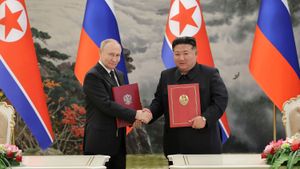The Canadian government has decided to lift the enhanced security screening measures for passengers traveling to India, which were put in place just days earlier. This decision, announced by the office of Transport Minister Anita Anand, follows the implementation of increased security protocols aimed at ensuring safety after several concerning incidents surrounding international air travel.
According to reports, the enhanced security measures began over the weekend, with Air Canada notifying travelers of anticipated delays due to heightened screening mandated by Transport Canada. The notification warned passengers, “Due to heightened security mandates by Transport Canada for all passengers travelling to India, security wait times are expected to be longer than anticipated for your upcoming flight.” Travelers were encouraged to arrive at the airport four hours prior to their flight to minimize disruptions.
These measures were initially introduced as precautions, following significant geopolitical tensions. Specifically, they arose after heightened concerns over security threats connected to various factions within the Sikh community and other issues affecting travelers from Canada to India. The measures were described by Anand as being implemented "out of an abundance of caution." But they surfaced amid rising tensions between Canada and India, particularly concerning accusations about the involvement of Indian agents in illegal activities and threats against Indo-Canadian nationals.
The decision to lift the screening was made public on November 21, reflecting the shifting circumstances surrounding travel safety and international relations. Anand's office noted, “The additional measures were deemed no longer necessary at this time.”
This shift came on the heels of prior escalations, including incidents earlier this year where Air India flight security had been called to attention due to bomb threats, which resulted in emergency landings. The heightened atmosphere surrounding flights to India was not only about operational safety, but also intertwined with broader diplomatic relations between the two countries.
Recent months have seen the Canadian government make public comments tying India to alleged threats against Canadian citizens, which has created significant friction between the two nations. Last month, the Royal Canadian Mounted Police (RCMP) stated there were credible threats against members of the Sikh community, directly correlatively linked to greater sentiments around secessionist movements, particularly the pro-Khalistan movement.
Officials from various levels of Canadian government have aimed to provide clarity during this tumultuous period. After the initial sweep of enhanced security, it became evident many passengers faced unnecessary delays and concerns over their travel plans. Anand assured the public of her commitment to both safety and getting things back to normal for travelers.
On November 18, tension built over alleged intelligence reports presented to parliament, sparking warnings from community leaders and considerable backlash from the Indian government, which vehemently denied any association with the criminal undertakings alleged by Canadian law enforcement. Such denials from India led to retaliatory actions, expelling Canadian diplomats and increasing scrutiny of demands for clarifications from the Canadian side.
Effectively, after only days of enhanced scrutiny, the Canadian government recognized the necessity to balance between maintaining necessary safety precautions and fostering international relations. Passengers can now feel relieved as they prepare for travel shortly before the holiday season, hence avoiding what could have been significant delays impacting journeys between Canada and India.
Both nations continue to grapple with the fallout from this series of escalations, as Canada seeks to navigate pressures from its domestic Sikh population and broader international diplomatic pressures. Meanwhile, as travel resumes, many travelers are reportedly optimistic about the ability to resume normalcy without extensive wait times at security checkpoints.
The Canadian government’s abrupt policy reversal highlights the complexity of global air travel, especially as international relations remain touchy amid sporadic incidents and allegations. It underlines the fine line officials must walk between ensuring safety and respecting international travel norms. The future of travel safety measures may remain uncertain as both Canada and India work to mend fences and address security concerns without compromising the rights and freedoms of its traveling citizens.



